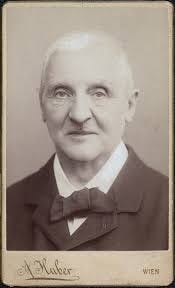
When people ask me what my favorite piece of music is, I find that question to really be a non-starter because I consider the entire artform indispensable. It’s sort of like asking a parent which of their children is their favorite. I normally respond with the somewhat canned response of, “I’m absolutely in love with whatever music I happen to be conducting this week.” While that’s certainly true, there are a couple of desert-island works that I simply couldn’t be without, and Bruckner’s Symphony №7 is one of them.

Bruckner was, without question, an ardent admirer and absolute acolyte of the music of Richard Wagner. He had been present in Munich for the premiere of Tristan und Isolde in 1865, and visited Bayreuth practically every summer, seeing the premieres of Der Ring des Nibelungen in 1876, and Parisfal in 1882. There’s a lovely silhouette of their encounter in 1873, when Bruckner presented both his second and third symphonies to Wagner.
However, I do not believe that Bruckner’s music is Wagnerian in the sense that people think. Wagner’s music is dramatic — music for the stage — and entirely thematic and character-driven (that’s the understatement of the century). Bruckner’s music is entirely symphonic and abstract in nature. And I mean abstract in the sense that there is never an overt thematic or dramatic message. We are left to come up with our inner-storyline for his music, should we choose.
There is one other aspect of Bruckner’s music that is often overlooked. More often than not, his music is characterized as religious in nature, and in its scope compared to the architecture of cathedrals. While these are certainly valid and useful comparisons, I find his symphonies to be humanistic in nature, not religious at all. It can be equally argued that they try to describe the mystery of the human condition, not the sacred. Indeed, many of his melodies are reworked folk songs from upper-Austria, which is something I learned when watching Nikolaus Harnoncourt rehearse the Vienna Philharmonic in this symphony nearly fifteen years ago.
Bruckner began his seventh symphony in 1881 and completed it in 1883, during which time Wagner passed away. It is interesting to note that Wagner didn’t dedicate the work to Wagner, but to Wagner’s benefactor, King Ludwig II of Bavaria. It’s premiere took place in Leipzig, under the baton of the great Wagnerian conductor, Hermann Levi, in 1885, to great acclaim and success, something Bruckner had never really experienced with any of his previous symphonies.
Off the top of my head, Herbert von Karajan recorded this symphony three times in the studio. My favorite is from the brief period that he went back to EMI in the 1970’s and recorded a few standards with the Berlin Philharmonic.
Another great interpreter of Bruckner from the second half of the 20th century is Günter Wand. For many years, he was the music director of the NDR Symphony Orchestra in Hamburg and this live performance from 1992 is a great example of his flowing, yet beautiful approach.
The very recording ever of a Bruckner symphony was of his seventh by the great, yet somewhat forgotten conductor, Oskar Fried, in 1924 with the Berlin Staatskapelle Orchestra. If you can listen past the crackle and hiss, you hear a truly great interpretation.
There are three great Bruckner interpreters from the middle of the twentieth century that everyone should explore. The Jochum brothers, Eugen and Georg, and Eduard van Beinum. The more famous of the two, Eugen Jochum recorded the complete Bruckner symphonies twice and this recording of the seventh with the Berlin Philharmonic is particularly insightful.
Eduard van Beinum is a conductor everyone should know. He was the conductor of the Concertgebouw Orchestra before Bernard Haitink, and there isn’t a recording of his that I haven’t absolutely loved. A musician’s musician and beloved by his orchestra, his two recordings of Bruckner’s Symphony №7 are indispensable. Pure passion!
Over the years, I’ve found some fantastic live performances on YouTube that are certainly worth a watch. Here’s a fabulous performance with Bernard Haitink and the Vienna Philharmonic.
And a very organic interpretation with Claudio Abbado and the Lucerne Festival Orchestra.
I leave you with another historical performance, but one that can never be overlooked. Wilhelm Furtwängler’s classic 1949 recording with the Berlin Philharmonic.